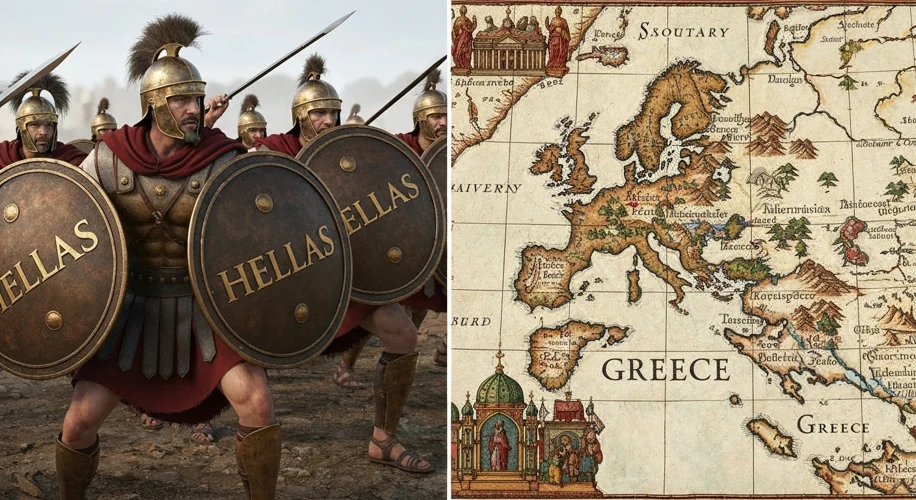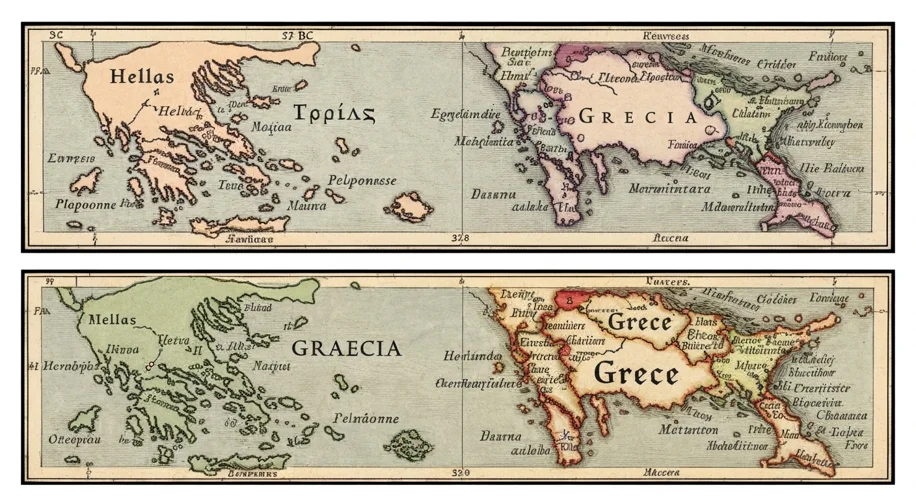Have you ever wondered why we call the land of ancient philosophers, democratic ideals, and epic myths “Greece,” when the people who lived there, and their descendants, have always referred to their homeland as “Hellas”?
This linguistic twist, a common thread in history, often reveals fascinating layers of cultural exchange, historical conquest, and the evolving way the world perceived a particular civilization. The journey from “Hellas” to “Greece” is a story that spans millennia, influenced by everyone from Roman conquerors to medieval merchants.
A Land of Hellenes
To understand the name “Greece,” we must first look to the self-designation of its ancient inhabitants: the Hellenes. The term “Hellenes” itself has a rich mythological and historical lineage, often traced back to Hellen, the son of Deucalion and Pyrrha in Greek mythology. Over time, “Hellenes” became the collective term for all Greeks, uniting disparate city-states under a common linguistic and cultural banner, even if political unity was rare.
The land itself was known to its people as “Hellas.” This term referred not just to a geographical area but also to a cultural and spiritual concept. The “Hellenic world” encompassed not only the mainland but also the Aegean islands and the Greek colonies scattered across the Mediterranean and Black Seas. Ancient Greek writers like Homer and Herodotus used “Hellas” to denote this shared cultural space.
The Roman Imposition: “Graecia”
The shift from “Hellas” to “Greece” in the Western world is largely attributed to the Romans. As the Roman Republic expanded its influence, it encountered the sophisticated Greek civilization. The Romans, in their interactions and eventual conquest, adopted a different name for the land and its people: “Graecia” and “Graeci.”
The origin of the term “Graecia” is somewhat debated, but it is widely believed to be derived from the name of a specific tribe, the “Graikoi” (Γραικοί), who inhabited a small region in Epirus. This tribe was among the first Greek peoples encountered by the Romans, particularly in southern Italy, where they had established colonies. Through a process of metonymy, the name of this single tribe came to represent the entire Greek-speaking world in the Latin language.

Imagine a Roman legionary, his segmented armor gleaming, marching across a landscape dotted with marble columns and crumbling temples. A banner, emblazoned with the Latin word “Graecia,” flutters in the wind. This visual encapsulates the moment when the Roman worldview began to impose its nomenclature upon the lands and peoples of the Hellenes.
The Medieval Bridge: “Grece” and Beyond
As the Roman Empire evolved into the Byzantine Empire, the Eastern part of which was Greek-speaking, the term “Hellas” remained in use within the empire. However, in Western Europe, the Latin “Graecia” persisted. During the Middle Ages, as trade routes and cultural exchanges continued, the term evolved further in various European languages.
In Old French, it became “Grece,” and in Middle English, “Grece” or “Grek.” These variations, all stemming from the Latin “Graecia,” became the common way for Western Europeans to refer to the land and its people. The Byzantine Empire, while undeniably the inheritor of ancient Greek culture, was often viewed by Western Europeans through a distinct lens, perhaps contributing to the persistence of the “Graecian” designation.
Why the Difference Persists
Today, the native term “Hellas” (Ελλάς) and its derivatives like “Hellenic” are still cherished and actively used by Greeks to refer to their country and identity. The modern nation-state is officially the “Hellenic Republic” (Ελληνική Δημοκρατία).
However, the name “Greece” has become deeply entrenched in the global lexicon. It’s the name used in international bodies, in most foreign languages, and in common parlance worldwide. This linguistic divergence is not unique; many cultures have different exonyms (names given by outsiders) and endonyms (names used by the people themselves).
Think of Germany, known as “Deutschland” to its people, or Finland, “Suomi.” The reasons behind these differing names are as varied as history itself, often rooted in early interactions, trade, and the historical narratives that different cultures constructed about each other.

Consider a visual dichotomy: on one side, proud ancient Greek warriors shield their faces with bronze, their shields bearing the proud inscription “Hellas.” Opposite them, a stylized medieval European map, with its intricate calligraphy and fantastical sea creatures, labels the same peninsula “Grece.” This juxtaposition highlights the persistent duality in how the land has been known.
The journey from “Hellas” to “Greece” is more than just a name change; it’s a testament to the enduring legacy of ancient civilizations and the complex, often surprising, ways their stories are told and retold across time and cultures. It reminds us that names carry weight, history, and the perspectives of those who gave them.

